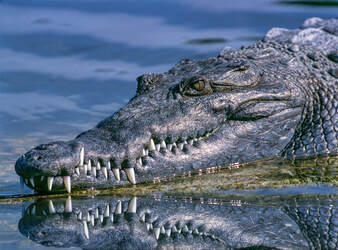 Crocodile parks are fascinating and unique destinations that offer visitors the opportunity to learn about these ancient and powerful creatures. In addition to providing a fun and educational experience for visitors, many crocodile parks also play an important role in conservation efforts to protect these endangered animals. In this blog post, we will explore the educational and conservation efforts of crocodile parks, with a specific focus on Dubai Crocodile Park. The Importance of Crocodile Conservation Crocodiles are one of the oldest and most primitive groups of reptiles, with a lineage that can be traced back over 200 million years. Despite their long history, crocodiles are facing a range of threats in the modern world, including habitat loss, pollution, and overhunting. As a result, many species of crocodiles are now endangered or critically endangered, and their populations are in decline. This is where crocodile parks come in. By providing a safe and controlled environment for crocodiles to live, breed, and thrive, these parks play an important role in conservation efforts to protect these animals. They also provide opportunities for education and outreach, allowing visitors to learn about the importance of crocodile conservation and what they can do to help. Educational Programs at Crocodile Parks One of the key roles of crocodile parks is to provide educational programs and resources that help visitors learn about these amazing animals. Many crocodile parks offer guided tours, talks, and exhibits that provide information on the biology, behavior, and conservation of crocodiles. For example, at Dubai Crocodile Park, visitors can explore a dedicated natural history museum that showcases the different species of crocodiles and their habitats, as well as the cultural and historical significance of crocodiles in different parts of the world. The park also offers educational panels throughout the visitor's path and has a team of expert guides who are available to answer questions and provide information. In addition to these resources, crocodile parks often offer specialized educational programs for school groups, researchers, and other organizations. These programs may include workshops, internships, and research opportunities that allow participants to learn about crocodile behavior and ecology, as well as the challenges facing crocodile conservation. Conservation Efforts at Crocodile Parks In addition to providing education and outreach, many crocodile parks are also involved in active conservation efforts to protect these animals. These efforts may take many forms, including breeding programs, habitat restoration, and research initiatives. One example of a crocodile park that is actively involved in conservation efforts is Crocodylus Park, located in Darwin, Australia. This park is home to a wide range of crocodile species, including the endangered saltwater crocodile. The park is involved in a range of research and conservation initiatives, including a breeding program that aims to increase the number of saltwater crocodiles in the wild. Similarly, at Dubai Crocodile Park, the focus is on providing a safe and healthy environment for crocodiles to thrive. The park's exhibit curator, Tarryn Clare, stated that their aim is to educate visitors about the importance of crocodile conservation and protection. Since the crocs moved into their facility, they have had several babies hatch, which is a positive sign that the animals are thriving in their new environment. Conclusion Crocodile parks play a crucial role in both education and conservation efforts related to these amazing animals. By providing a safe and controlled environment for crocodiles to live and breed, these parks help to protect endangered species and promote conservation efforts. Additionally, by offering educational programs and resources, they help to raise awareness about the importance of crocodile conservation and what individuals can do to help. Whether you are a student, a researcher, or simply an animal lover, visiting a crocodile park can be a fascinating and rewarding experience that provides valuable insights into the biology, behavior, and conservation of crocodiles. Comments are closed.
|
- Home
-
Tickets
- Best Deals >
- Ain Dubai >
- Desert Safaris
- The Dubai Balloon
- Snow Abu Dhabi
- SeaWorld Abu Dhabi
- AYA Universe
- Louvre Abu Dhabi
- Etihad Towers Abu Dhabi
- Dubai Crocodile Park
- Topgolf Dubai
- IMG Worlds of Adventure
- Cruises
- Aquariums
- Sky Views
- Green Planet Dubai
- Al Ain Zoo
- Madame Tussauds Dubai
- Museum of the Future
- La Perle Show
- Burj Khalifa
- Laguna Waterpark
- Game Space DXB
- Jungle Bay Waterpark
- Dubai Frame
- Dune Buggy
- Ski Dubai
- Zombie Apocalypse
- Deep Dive Dubai
- Hop-on Hop-off Bus Tours
- Hotels
- Destinations
- Blog
- About Us
- Contact
- Home
-
Tickets
- Best Deals >
- Ain Dubai >
- Desert Safaris
- The Dubai Balloon
- Snow Abu Dhabi
- SeaWorld Abu Dhabi
- AYA Universe
- Louvre Abu Dhabi
- Etihad Towers Abu Dhabi
- Dubai Crocodile Park
- Topgolf Dubai
- IMG Worlds of Adventure
- Cruises
- Aquariums
- Sky Views
- Green Planet Dubai
- Al Ain Zoo
- Madame Tussauds Dubai
- Museum of the Future
- La Perle Show
- Burj Khalifa
- Laguna Waterpark
- Game Space DXB
- Jungle Bay Waterpark
- Dubai Frame
- Dune Buggy
- Ski Dubai
- Zombie Apocalypse
- Deep Dive Dubai
- Hop-on Hop-off Bus Tours
- Hotels
- Destinations
- Blog
- About Us
- Contact
DUBAI Tickets. Book tickets online. This website is providing links to ticket resellers.
|



